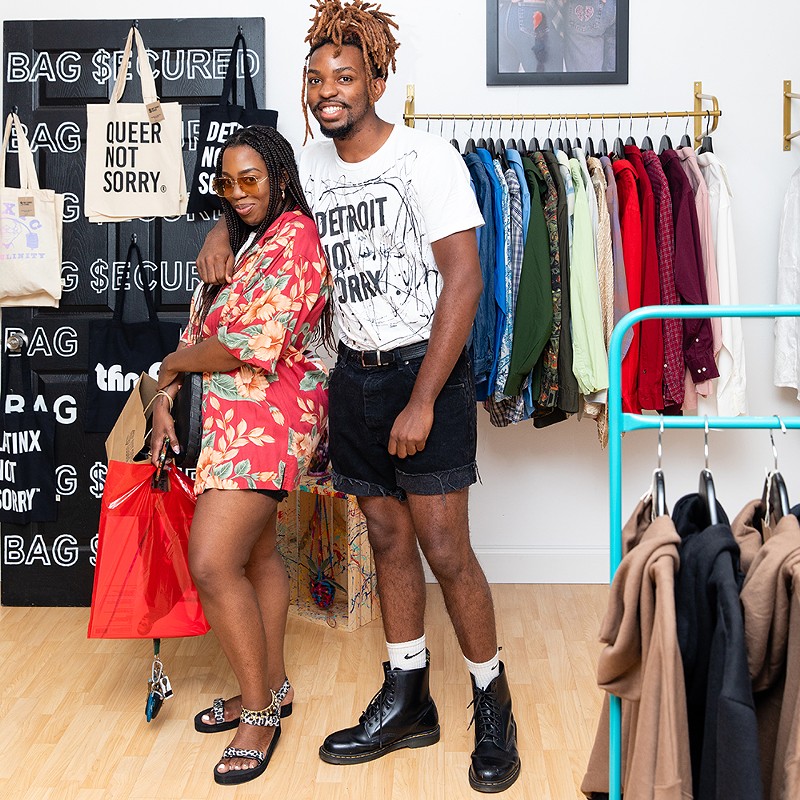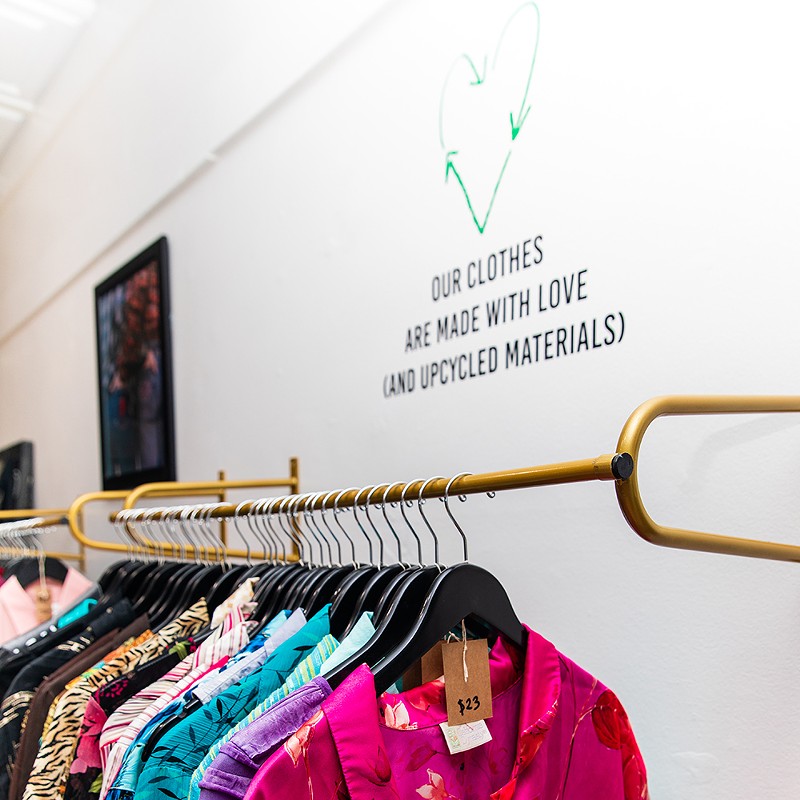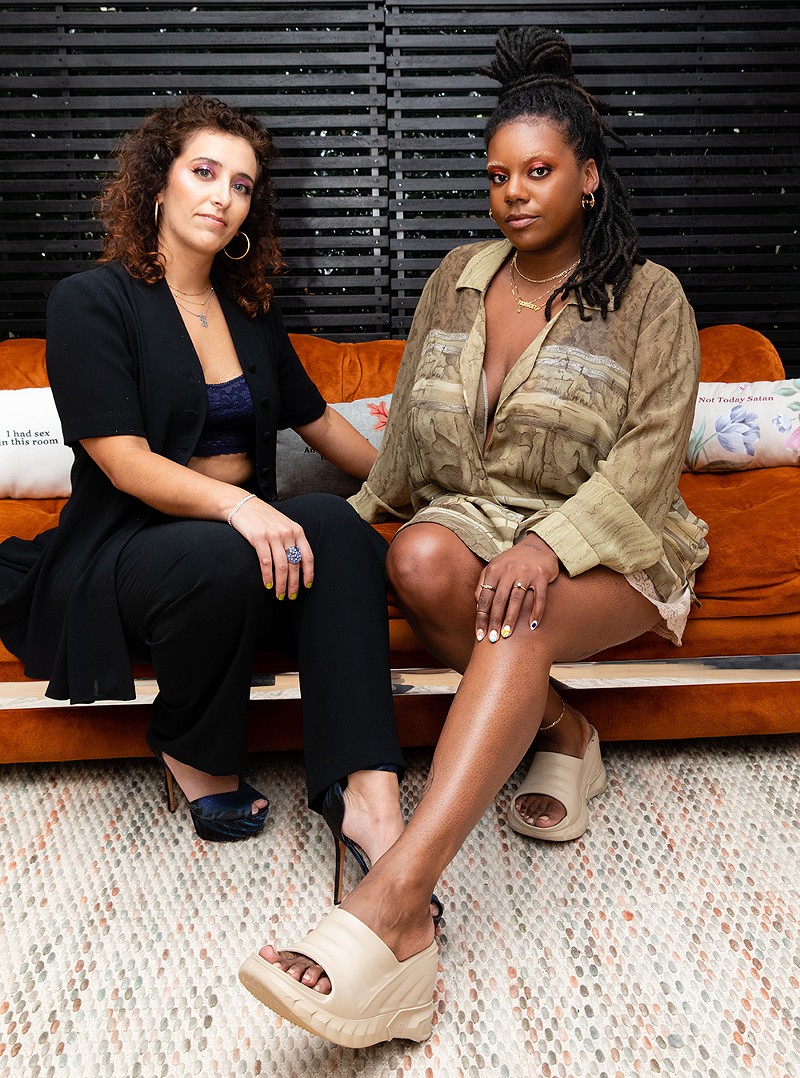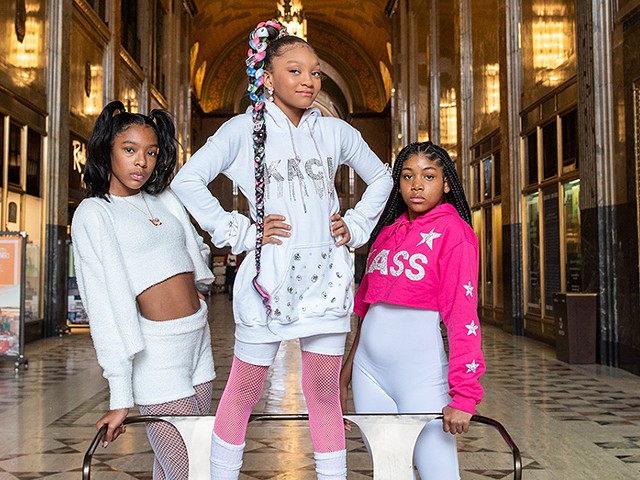
In the heart of Ferndale lies the woman-, Black-, and Latinx-owned Not Sorry Goods, a stylish, safe haven for the unapologetic. Underneath a rainbow-tinged neon “OPEN” sign, a bold message against intolerance is etched on a glass pane near the door: “NO PLACE FOR Homophobia, Transphobia, Violence, Racism, Sexism, Hate.” Inside, a shock of pristine, stark white walls help frame eye-popping garments appealing to both masculine and feminine styles and silhouettes, neatly curated as if one was stepping into an art gallery. The embroidery machine stands in clear view, so patrons can see the process of reinvigorating looks firsthand. A wall of fake, forest-green vines serves as the backdrop behind a cash register surrounded by tidily displayed stickers, earrings, patches, and other accessories. In the back of the store, a vintage tangerine sofa is situated near the dressing area. Full-length mirrors abound for model posing and selfie-takers. The bold ‘fits, harking back to ’90s and Y2K style eras, feel like political acts of resistance as much as wearable art which seduces the imagination. Your dollars may not be safe for long.
The visionaries behind Not Sorry Goods, Dy-Min Johnson and Jessica Minnick, have created a store overflowing with upcycled garments, as well as apparel and lifestyle products made by women, queer, and Black and brown designers and artists. Their signature mantra “NOT SORRY,” and its variations, including “DETROIT NOT SORRY,” “BLACK NOT SORRY,” and “QUEER NOT SORRY,” embellish patches and tote bags, among others. An “ASIAN NOT SORRY” patch recently hit the baby shelves near the register.
The owners stand firm in their convictions about the people they serve: the eco-conscious aesthete, the stylish people who don’t subscribe to Euro-centric beauty standards, the folks who belong across the gender spectrum and want to telegraph the truest parts of themselves without saying a word.
“We want people to feel super comfortable here. So you’ll find that things aren’t labeled by gender. Things aren’t even labeled by size — like, it’s usually more about the color,” Johnson says. “So you kind of have to look through and really find what you like. We’re not going to tell you what to like. And we’re open to, like, whatever your gender or sexuality is.”
The space acts as an incubator for disruption. Here, they possess a tough spirit of realness, just like Detroit, and a devotion to eco-friendly practices, filtered through their progressive lens toward fashion, self expression, and politics.

Upcycling as a love language
The Not Sorry Goods legend began with a sparring match. Johnson says she met Minnick during a kickboxing class. The two began duking it out, each of them trying to win the fight. Afterwards, they immediately clicked and embarked on their first collaboration, a crop top featuring a knockoff of the Kellogg’s cereal logo made from the mesh of a youth soccer pinnie, commonly worn during scrimmages outside of formal competitions. The frock quickly earned fans, says Johnson, and more creative ideas for designs snowballed from there. A series of successful collaborations led to the creation of the brand.
Growing up in metro Detroit, Johnson has always had an eye toward stylishness. During high school lunch breaks, she shopped at a nearby Salvation Army thrift store. Those trips helped ignite her creativity, and after earning her psychology and women’s studies degree from the University of Michigan in Ann Arbor and a not-so-fulfilling career stint immersed in office culture and norms, Johnson pivoted toward her entrepreneurship.
“A big part of why I couldn't really handle the corporate world [was] because it kind of, at least for me, made me feel like I needed to shove my Blackness down and shove my aesthetic down and shove like, even how I dress down and like try to conform as much as possible,” she says. “And what I learned is, it doesn’t work. No matter what I do, I’m still the Black girl, so I might as well do what I want to do.”
Not Sorry Goods has been in the retail business for six years and currently has three employees: Minnick, Johnson, and a production assistant. The creatives relocated to their flagship store near Nine Mile Road and Woodward Avenue, after stints at the nearby Rust Belt Market, the now-defunct Cass Collective in Midtown, and Ponyride, a makers’ space for the socially conscious. They’ve also held pop-ups at local holiday markets. They made tees and face masks for Hello Alice, a platform for small businesses that offer mentorships and grants, and completed some embroidery projects for Playground Detroit, among a long list of clientele. Most recently, they are collaborating with the Charles H. Wright Museum of African American History to create an upcycled fashion collection for Earth Day by giving the museum’s inventory of T-shirts second lives as dresses, teddy bears, and pillows, to name a few examples. “So that’s super exciting and probably the biggest upcycling project we’ve done for someone else,” says Johnson, who notes upcycling is also a focal point of their business. They also sell items online.
Upcycling, also known as creative reuse, involves repurposing unused or waste materials into new products. Champions of the practice like Johnson say these reinvigorated items carry more artistic resonance and if created from high quality materials, can last much longer for the wearer, instead of throwing a garment into the garbage. “Upcycling keeps something in your closet for like, even another nine months, [and] decreases your carbon footprint by so much,” she says. “Which is like a really big thing, and part of why we stick with that business model.”
“Upcycling keeps something in your closet for like, even another nine months, [and] decreases your carbon footprint by so much,” says Johnson.
tweet this
The clothing retail ecosystem has been dominated by fast fashion behemoths like Shein. Fast fashion brands are known for their barrage of aggressive marketing ads, substandard labor conditions, and planet-harming mass production and waste. As consumption and production of cheap clothes has risen over the years, the global fast fashion industry has garnered scrutiny for its hazardous impact on the environment. Researchers say the industry produces about 8 to 10% of global carbon emissions each year. Most fast fashion items, made from synthetic fibers, are shipped to landfills or incinerated. If they end up in landfills, they will not decompose. In 2012, a fire in a Bangladeshi garment factory, known for its poor safety, killed more than 100 people. Yet the desire for ethical consumption often clashes with most people’s economic realities. Within certain online style forums, there’s also been years-long debate about whether or not shaming people for buying clothes they can afford online is inherently classist.
Among fashion diehards, there’s also the pressure of looking current and relevant. Look no further than social media and the inundation of hot trends and micro trends congesting news feeds, cycling in and out of our attention. Keeping up with these trends, Johnson says, can be exhausting, psychologically and financially. And she sees upcycling as a way to help someone hone their authentic personal style, unwedded to what the internet hive mind thinks is all the rage: “something that really suits you and something that you want to hold on to, versus something that you got to try to look like this random chick on Instagram,” she says. On top of that, a person can keep refreshing their wardrobe without buying more clothes and spending a lot of money, Johnson adds. Essentially, these purchases can be considered long-term investments.
Metro Detroit’s thrift and vintage store gems
Flamingo Vintage
5449 W. Vernor Hwy.; Detroit; flamingovintagedetroit.com
Opened in 2018, this Southwest Detroit shop specializes in vintage clothing and has sold items to movie productions, wardrobe stylists, musicians, and artists in the Motor City and beyond.
Public Thrift
10237 Joseph Campau Ave., Hamtramck; detroitpublicthrift.com
After launching as a pop-up in 2020, this worker-owned thrift store opened a brick-and-mortar in Hamtramck in 2022.
Rat Queen Vintage:
10031 Joseph Campau Ave., Hamtramck; facebook.com/RatQueenVintage
A quirky vintage shop known for its eccentricities, like displaying pet rats and discount items on display in a “bargain casket.”
Ann Arbor Thrift Shop:
3500 Washtenaw Ave., Ann Arbor; annarborthriftshop.org
Operating since 1932, this nonprofit is run by volunteers and has given more than one million dollars to local individuals and families in need.
Vintage Vibes:
16128 Middlebelt Rd., Livonia; 734-469-4045; vintagevibeslivonia.com
The new kid on the block has 5000 square feet of prime vintage goodies. Grandma bought it, mom threw it out, now you’ll buy it back here!
‘Never apologize’
Not Sorry Goods is also a garden of provocative and technicolor delights. Local artists India Solomon, billydagoat, EMLE, and others created the hoodies, tops, and other items hanging from reused clothing racks. There’s also crocheted, checkered bucket hats. Eye-catching Barbie-pink tote bags designed by local DJ Problematic Black Hottie are also on display. Accessories-wise, the store also sells pronoun earrings crafted by another local brand called Queerfonts and heart-shaped and cloud-shaped sunglasses in the colors of red, pink, yellow, navy blue, sky blue, and more. Among their newest arrivals are long sleeve shirts made by the queer and woman-owned screen printing shop the Dom Press, based in metro Detroit. The shirts are emblazoned with messages like “LESBIANS INSPIRE LESBIANS,” and are popular among customers. You’ll also find what’s been cheekily dubbed the NSFW “spicy rack” showcases tops with cartoonish, erotic imagery. Besides clothing, they also carry vinyl records from local label Choose Better Friends, perched near the mannequin display. The owners are hoping to carry even more local vendors in the near future.
Although foot traffic has been a little slow this past winter, Johnson hopes the business will pick up as spring comes along. Over the years, they’ve built up a loyal fanbase of customers who’ve helped keep them afloat. In the meantime, the upcoming Secure the Bag sale on Saturday, April 1 may entice new ones. It’s essentially a buffet for ‘fits. If shoppers bring in their own tote bag and pay $30, they can stuff the bag with as many items the bag can reasonably hold. If they don’t have their own bag, they can buy one in-store for $40. It’s never too early to shop for Pride, so Johnson hopes customers will swing by and cop some clothes for the June celebration.
Not Sorry Goods is on another mission. Here, inclusivity matters. They provide bold looks for primarily women, Black and brown, and LGBTQ people whose apparel tastes and desires may be ignored by more mainstream brands. The shop also caters to different body types, and the owners can customize or alter clothing based on the person’s aesthetic preferences. And it’s also a safe place for personal self-exploration. Aspiring style mavens, Johnson advises, should always try on the clothes. She often witnesses shoppers’ eureka moments up close, like when a person who isn’t a cisgender woman tries on a mini-skirt for the first time. Maybe they aren’t comfortable with a full-on feminine look just yet, but this is the place to take those baby steps. And a lot of those baby steps happen here. “Never apologize for being yourself,” Johnson says.
Location Details
Coming soon: Metro Times Daily newsletter. We’ll send you a handful of interesting Detroit stories every morning. Subscribe now to not miss a thing.
Follow us: Google News | NewsBreak | Reddit | Instagram | Facebook | Twitter







